Forging a bass-playing career, despite seemingly insurmountable odds
Exclusive interview with FBPO’s Jon Liebman
October 12, 2020
To say that Michael Micucci had a challenging upbringing would be a gross understatement. Despite the fact that the New Hampshire native and his mother were homeless during his early years, Michael eventually bootstrapped himself and pursued a career as a professional bass player. Having proved himself a competent groover, Michael started getting hired for various funk, rock, and jam bands before developing a love for jazz, which inspired him to study with Don Williams, George Westbay, and longtime Berklee bass professor Bruce Gertz. Michael is currently the bassist for The Company Stores, a multi-genre band from Charleston, West Virginia, with styles ranging from Appalachian folk to Delta blues, hip hop, and beyond.
FBPO: How did you become a bass player?
Micucci: I’m from a very broken up family. I spent my formative years homeless. My earliest memories are squatting in abandoned mill buildings and sleeping in a car and busing tables at Friendly’s before the waitresses got to it, for breakfast, right? So, that was our thing. My mom taught me to read during that time, but eventually she married a guy named Carl Micucci. That’s where I got my last name. The years I spend sharing a roof with Carl Micucci represent most of the healthy, stable and positive growth environments I had as a child. My father lives as an example of integrity, honesty, and the unstoppable force of love. I made every part of our life much harder than it needed to be, as we do when we grow up in such colorful environments. Even so, when it was my turn to care for for my sister Anna as a single parent, I humbly thank my father for the parts I got right: 1) Work hard, tell the truth; 2) Work to YOUR standards — your work is your name; 3) Family dinner is always there. No matter what. And I think it’s really relevant because my challenging, traumatic childhood ended up, in a very real way, forcing me to begin playing music. I was working at a grocery store and a co-worker, who happened to be in this band I really liked, a skateboarder kid, was selling his bass. And I was like, “Why not, man? I’ll buy a bass, try something here.” So I bought this Epiphone bass from him, with three strings on it. It didn’t have an E string.
FBPO: I gather you’d never played any instrument before that?
Micucci: No, never in my life. But I’d always been really drawn to music. I would stay up all night listening to music. I would listen to really angry, hardcore, death metal, or whatever I was in the mood for, or gangster rap. I was 14. It was the ’90s, so I was listening to a lot of Dre, and Snoop. But what happened next is I got that bass. And Dwayne, the guy I bought it from, gave me this Hal Leonard book and it had the theme to Peter Gunn as the first exercise. I remember that was the first thing I learned, and man, I just stayed up all night and learned it. Music allowed me to express my emotions that I didn’t have words for at the time. There is no word for, “This is really hard. I don’t think this is fair. I’m underwater. I grew up homeless. I don’t know what to do here.” There’s no word for that, but you can play that song. You can just be an angry kid and make that noise. And that was incredibly therapeutic for me. I’ve never been able to stay away from playing. It made me dig around in the really challenging soils of my upbringing, and to synthesize all that in a way that made sense to me I think has allowed me not only with playing, but especially, as a teacher, as an educator. I think that really helped.
FBPO: What if your friend Dwayne happened to have a saxophone, or a guitar, or a trumpet, say? Would you have bought whatever he had, or was there something special about the bass that you found appealing?
Micucci: Great question! At the time, I liked the sound of the bass. It was either going to be bass or guitar at the time, because I was just a huge metalhead. But I think if it he had had a drum set, I would’ve bought a drum set. I just needed something. But it would’ve been hard to practice that all night, so I think I bought the right instrument.
FBPO: What happened after you bought the bass?
Micucci: I was in high school and somebody heard I had a bass, because it was a pretty small high school and they were in a crappy band, just a high school hippie band, and I joined it. The guitarist was taking lessons with this guy, George Westbay, a Berklee graduate, probably about 60 now. Great guy, great player. So he introduced me and he said, “Hey man, come take lessons.” I said, “Great!” So I started taking lessons with George and he taught me a ton! I mean, he had to be, I don’t know if this is normal, but pretty much right off the bat, he had to be working on “Teen Town” and “Spain.” I remember that very specifically.
FBPO: Whoa!
Micucci: I know! I know! Jaco’s “Teen Town” and Chick Corea’s “Spain.” and I couldn’t read music at all. I had nothing yet.
FBPO: Had you gotten an E string by that point?
Micucci: [Laughs] Yes, I had! I had four strings at that point, and I had switched over to a fretless. My first influence, by the way, not Jaco, was Bakithi Kumalo. That’s my guy, man. I know you’ve interviewed him and I’m jealous! So I was studying with George and he taught me some really tough stuff, but he wasn’t teaching me to read. He was teaching me to hear, to play rhythmically. I think because he was a guitarist, he figured all the harmony was easy. He was like, “These pieces really taught me a lot about rhythm and I think that’s important, so I want you to work on this.” So I said, “Great.” And so those are my first real performance tunes.
FBPO: How did you learn to read?
Micucci: Interestingly, he was like, “I don’t want to write anything out for you to read. Let’s go down to the music store.” So he flips through five books and he picks up Funk Bass, by Jon Liebman. No joke! George taught me to be a bass player. He taught me all about the scales and modes, and he had great right-hand technique, but I learned to read out of your book. He took me down and he showed me your book. He said, “Look, man, when you can read this, I’ll start calling you for gigs.” I said, “Okay.” So I learned that and he started calling me for gigs. It was great!
FBPO: For somebody who didn’t know how to read, I don’t know that Funk Bass would be the first book I would lay on them. But it is great for reading rhythms.
Micucci: Exactly! Rhythmically, it’s a complex book, but the first chapter I remember really well. It was all open strings, so in a sense, it was a great call by George because I was hungry. I wanted a challenge, and he knew it.
FBPO: When did you start playing upright?
Micucci: I’d moved out to Boston. I was only in Boston for a year and a half, but my goal was to become a professional bassist. I was very young and dumb, but I also had a plan. I went out there and I got an apartment. I had just done this gig with a guy, and he was like, “I got a band in Boston. They need a bass player. And the bass player just moved out of the house, so you should probably just go there.” I said, “Okay.” So I just went there. I started paying rent and scratching around for gigs.
FBPO: How did you pay the bills?
Micucci: I was just scratching around for gigs. I didn’t have any money, but I was a professional bassist. I had learned to read by then, so I was doing theater gigs, a lot of that. I did Evita, and Little Shop of Horrors, and Sweeney Todd. I did all that stuff. And I started taking lessons with the greatest teacher I’ve ever had in my life at any time. I tried the Berklee thing for a second, but it was going to cost a lot of money. Instead, I started calling the bass department, and Bruce Gertz answered, and I started studying with Bruce Gertz.
FBPO: I love Bruce! He always makes me smile.
Micucci: I’m so glad you said that because my experience with him, I just left every time feeling like I was a great person and I could totally handle this. I would sit down with Bruce. I don’t remember him ever playing a bass. I don’t think he ever touched a bass when we were in lessons. We would just talk. He’d be like, “All right, man. What are you working on?” And I’d play, and he’d be like, “Cool. You’re counting wrong, but keep doing it, and let’s work with it.”
FBPO: The Company Stores has been described as modern Appalachian rock. Would you say that’s a pretty accurate description?
Micucci: I think it is. I think we’re heading in a very “post” direction now, post-rock, Radiohead-ish. Man, I don’t know; we’re all over the place with genres. Anything we do, we do very genuinely, and we take great care to really work with the harmony and the structure of songs, which has been really fun for me with my jazz background. They’ve really opened my eyes to the classical world. I think in the end, the backbone of everything that I had always done up until The Company Stores had still been improvised, unless I’m sight reading something. But if I’m playing with a band and expressing myself, this is the first band I’ve ever had to be so precise and really wait until the “and” of four to come in, really do it, or else you get a look. That was new to me. I had been doing nothing but jazz for twenty years. Jazz to me is a little bit like bluegrass, where the history is specific and the shout choruses are specific.
FBPO: How did you discover NS Design basses?
Micucci: I had three basses for twenty years. I had a Warwick “Streamer” 4, my upright, and a fretless 5. This woman called and she said, “I got a record and I need a bass player and I know you can play. So, will you come check it out?” And I said, “Sure.” So I show up over there and I play. We record this album, easy peasy. She’s a singer/songwriter. And there’s this lead guitarist on it. He says, “Mike, thanks for playing. We can’t pay you, but I have a present for you.” I said, “All right. Thanks, man. That’s really kind.” And he comes with this tube. And I start unzipping it, and in there is what appears to be just the neck of an upright bass. I had never in my life before seen an electric upright bass, but it turned out to be an NS Design CR4 electric upright bass. And he was like, “I don’t know, I picked this up somewhere. I haven’t touched it in ten years. It’s yours. Good luck.” I couldn’t believe it. But that’s exactly what happened.
FBPO: It sounds like you were hooked right from the start.
Micucci: That was the first time I’d ever seen an NS bass in my life. I got this NS bass handed to me. I just start playing it. I fell in love. I love the sound so much. And I stayed up all night playing that bass. Again, I was too excited to sleep. And then that NS became my primary instrument for that band. It’s got active electronics on it, so you’re able to dial in really modern tones if you want to. It sounds great for metal. Tony Levin uses it, obviously, for King Crimson.
FBPO: You’re playing their electrics too, aren’t you?
Micucci: They’re making me two basses right now, two 6-string basses, which is amazing. These are both Radius basses. I came into NS via the upright, but (NS Design Artist Relations Manager) Corey Redonnett was very interested in getting me playing the Radius. He’s like, “Look, man, I love the way you play, but we got to get you on the sideways bass.” I guess they have an easy time moving those uprights, but the Radius, they really want feature right now.
FBPO: Is that what we call the electric bass now? The sideways bass? I love that!
Micucci: [Laughs] I made that up. You like it?
FBPO: Yes!
Micucci: I’ve been saying that for a minute. I like it. I think it’s funny.
FBPO: More and more people from all over the world are coming to forbassplayersonly.com to learn bass. What advice can you impart to somebody who wants to learn to play bass?
Micucci: Easy question! The single most important skill in being a bassist is to synthesize and express the moment elegantly. The moment that’s happening on stage and with the crowd, it’s your job to pull all that together, the drummer, the guitarist, the singer… There is no single more important thing to do than to say yes to every opportunity you reasonably can to play with other people. I 100% believe that. I mean, everything else you can learn in a book, or from a teacher. But the ability to play with a bad quartet and make them sound good, that’s the most important job. That’s it. That’s the most important skill. And I truly believe the only way to flex that muscle is to say yes to every reasonable opportunity you can play, keep your ears open, and learn something from everyone. I think that has served me really, really, really well.
FBPO: What’s on tap for the future?
Micucci: What’s going on right now is mostly musical stuff. I’m really happy about it, The Company Stores. I’m also working at a place called Coda Mountain Academy. It has four programs. One program is dedicated simply to collecting food from the community and driving it around to needy families. The second program is specifically for behaviorally and emotionally challenged children. Then there’s a third program, which is after school tutoring for regular pedagogical stuff: math, English, social studies. And then there’s a fourth one, which is music instruction. It’s an incredible place. I am so blessed and lucky to be there. It’s unbelievable. It’s the coolest place in the world. Also, NS has really, really fascinating plans for me. They connected me with Bakithi Kumalo. I think Bakithi wants to build a school in Pennsylvania next and Corey is looping into that because he knows about my curriculum writing past and my teaching background. I’m not sure exactly what the details are, but there’s something brewing there that I’m really excited for. The idea of working with Bakithi, what an incredible idea that is!
FBPO: What would you be if you weren’t a bass player?
Micucci: I’m a teacher. For the past twenty years, I was teaching school. I created an original curriculum, actually. I wrote it from scratch for this Montessori school, right next door to me called the New River Gorge Learning Co-Op. I taught there for a couple of years. Prior to that, I worked at a children’s mental hospital. That’s where I learned to teach, really, all the way back when I was 19. I paid the bills working at a children’s mental hospital. My job was to stop them from murdering each other. True story.
See Jon’s blog, with key takeaways from this interview, here.
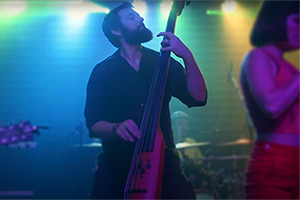
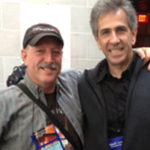
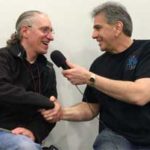
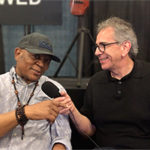

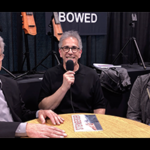

When I read an interview like this, I’m really inspired to step up the daily work by
practicing more effectively. Why, you never know what is around the corner. You
can only work and be ready if an opportunity comes. My own experience in a field
totally unrelated to being a bassist has rounded me as a person. At an early age
we musicians have to be creative in figuring out how to be responsible, but never
neglecting to grow as a musician in some way.
💯 Ted. Inspiration exists, but it has to find you working. I’m humbly inspired that you read this, and overjoyed at the thought of this article inspiring you to hit the shed. see you in there. 💪🏼